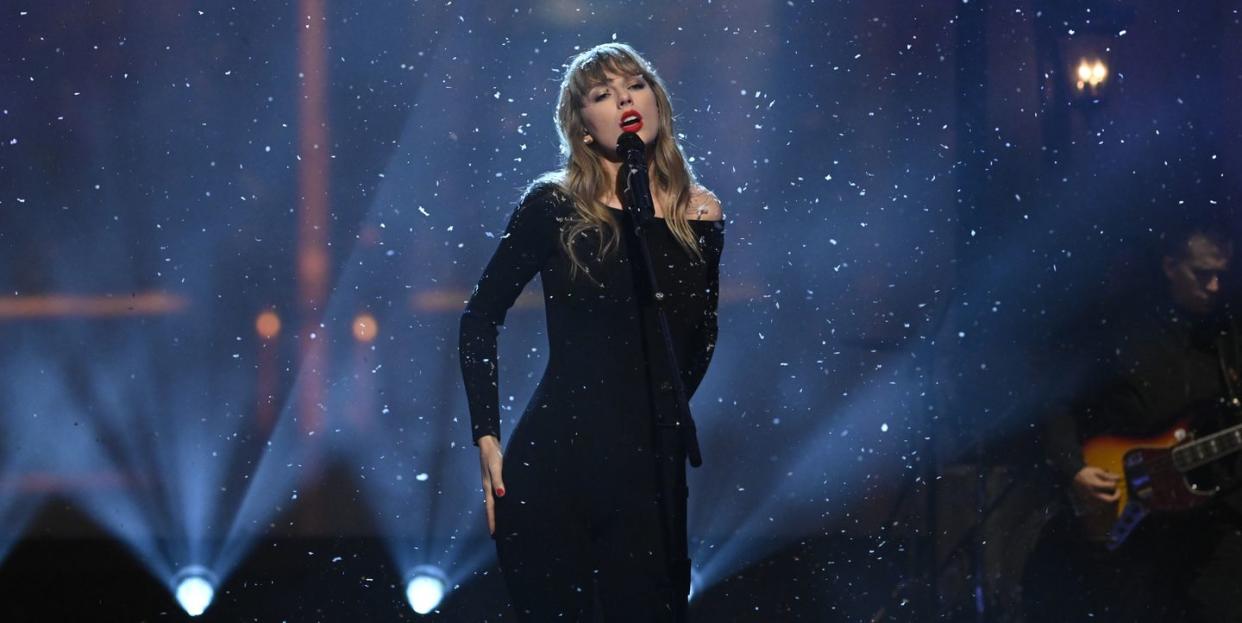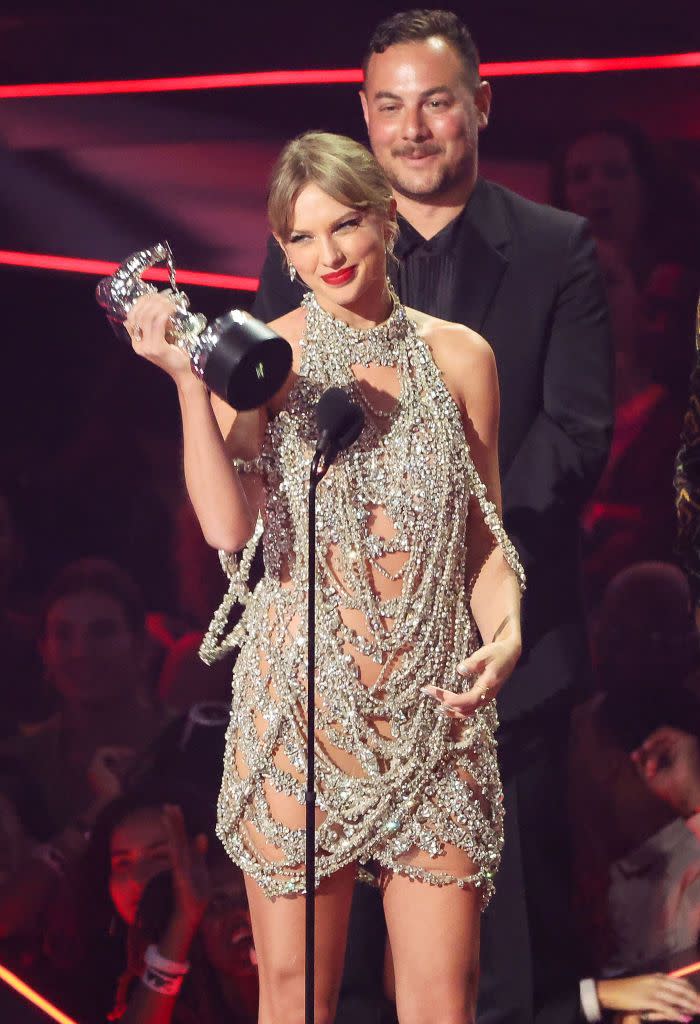Taylor Swift’s 'Midnights' Does Something Astonishing. Even For Her.

Songwriters have never been able to resist midnight. Patsy Cline went out “Walkin’ After Midnight,” Judas Priest reveled in “Living After Midnight.” Midnight at the oasis, send your camel to bed. He’s leaving on that midnight train to Georgia. The Midnight Rambler, the Midnight Rider, the Midnight Special—it’s mysterious and sexy, full of foreboding and promise. It always works.
After Taylor Swift announced her tenth album in August while picking up her trophy for Video of the Year at the MTV Video Music Awards (for the epic, ten-minute “short film” version of “All Too Well”), she followed up with a post explaining that Midnights would be "the stories of 13 sleepless nights scattered throughout my life.” As the countdown to release reached fever pitch, she explained that the album was inspired by five topics: self-hatred, revenge fantasies, "wondering what might have been," falling in love, and "falling apart.” That might be too broad a canvas to really call the project a concept album, but Midnights may be Swift’s most cohesive, most consistent, and most revealing music yet.
Her last all-new release was the miraculous double-shot surprise of folklore and evermore in 2020 (last year came the re-recording of 2012’s Red), but the crystalline indie-folk and carefully etched character sketches of those albums are nowhere to be found on Midnights. After head-faking us with visuals steeped in ‘70s imagery (rotary phones, wood paneling), the sound of this album sits squarely within contemporary electro-pop, and the focus of the lyrics shifts back to Swift herself.

Let’s talk strategy for a minute, because with Swift, it’s always part of the package. She executed something astonishing (even for her) with this album roll-out, gathering all the benefits of building up anticipation with an old-school, months-long release campaign, without dropping a single note of music before the album came out. When it finally debuted, it landed with the impact of a 21st century surprise release. And then—three hours after Midnights hit the streaming services—she put out seven additional songs for the “3am Edition,” sending fans into a further frenzy. Result? A new record for the most-streamed album in a single day.
Yet all this comes without anything that sounds like a huge hit single. The first music video, which arrived that same morning, is for “Anti-Hero”—a confession of self-doubt which opens with the line “I have this thing where I get older but just never wiser,” and goes on to describe a weird fantasy of her future children murdering her and fighting over her will. (Although who the hell knows? “Heat Waves” by Glass Animals, with a similar pulsing, burbling vibe, just broke the record for longest run on Billboard’s Hot 100 Singles chart.)
Once again, Swift’s partner in crime is the ubiquitous Jack Antonoff, who co-wrote and co-produced the bulk of the material with her. (The pair have collaborated frequently, starting with Swift's monstrously successful 1989 album in 2014.) The vintage synths and distorted vocals aren’t exactly cutting-edge, and the steady, dreamy mid-tempo groove flirts with excessive repetition; some songs almost don’t register on a first or second listen. Regret, revenge, reflection—these aren’t new themes for Swift, and the album is certainly a refinement more than a reinvention.
But the nuances of sleepers like “Labyrinth” and “You’re on Your Own, Kid” reveal themselves, and where Swift’s most recent straight-up “pop” albums Reputation and Lover sometimes felt overstuffed with efforts to satisfy all of her constituents, the absence of a big, glossy rah-rah single or an obligatory acoustic-based ballad feels like the point.
What also emerges—and demonstrates that the narrative-based approach of the folk/more albums left a lasting mark—is a mature perspective on her own journey, a hard look at the determination, ambition, and sacrifices that got her to such rarefied altitude. “You’re on Your Own, Kid” seems to look back at her early days as an aspiring star in Nashville—“I hosted parties and starved my body/Like I’d be saved by a perfect kiss”—while “Midnight Rain” muses on how her path left behind partners who didn’t understand her dreams. “He wanted a bride, I was making my own name,” she murmurs, “Chasing that fame, he stayed the same.”
But with staggering success comes expectations and responsibilities, and she addresses the resulting fear and pressure. “You know how much I hate that everybody just expects me to bounce back/Just like that,” she sings in “Labyrinth.” About to turn 33, Swift presents Midnights as an expression of universal emotional turmoil (“We twist in our self-made cages and pray that we aren't—right this minute—about to make some fateful life-altering mistake,” she posted), but confronting her own experiences with fame and fortune adds weight that bolsters the songs’ impact. On “Karma,” she sings “Ask me what I learned from all those years/Ask me what I earned from all those tears/Ask me why so many fade but I’m still here.”
And Taylor’s got bars! Extra points for the degree of difficulty in lines like “Did you hear my covert narcissism I disguise with altruism/Like some kind of congressman” and “Industry disruptors and soul deconstructors/And smooth-talking hustlers out glad-handing each other.” Ever the honor student, she takes obvious pride in working “Machiavellian” and “gender roles” into the lyrics, though there’s still a clunker or two: “Talk your talk and go viral/I just need this love spiral” is pretty weak, but then, yikes, there’s “Sip quiet by my side in the shade/And not the kind that’s thrown/I mean, the kind under where a tree has grown.”
After the high emotional highs of “Snow on the Beach” (a much-anticipated duet with Lana del Rey in which Lana’s voice is tough to distinguish) and the badass “Bejeweled,” and low lows including the knockout break-up lament “Maroon,” we find Swift and longtime boyfriend Joe Alwyn (credited as a co-writer under the pseudonym William Bowery) enjoying domestic bliss on “Sweet Nothing.” Over a spare, tinkly keyboard, she notices a pebble they picked up, shares her own weaknesses, celebrates their insulation from a brutal world—“outside they’re push and shovin’/You’re in the kitchen hummin’.”
Which would be one way to end the album. But that song is followed immediately by the breathtaking “Mastermind,” Swift’s revelation that her life—including her relationship and her career—is no happy accident, it’s all happened by design. “If you fail to plan, you plan to fail,” she sings, “Strategy sets the scene for the tale.”
And (with the caveat that it’s always dangerous to take art as something purely autobiographical) she goes on to offer a psychological explanation of her intentions: “No one wanted to play with me as a little kid/So I’ve been scheming like a criminal ever since/To make them love me and make it seem effortless/This is the first time I’ve felt the need to confess.” We’ve come from her sneering “Look What You Made Me Do” a few years ago—defensive, reactive—to fully owning her actions. Seems like a breakthrough to me.
Which would also be a way to end the album, and was for a whole three hours, until the “3am Edition” came out. Credit to her next-level vision: While some of the additional songs (a few produced by Aaron Dessner of The National, who worked on much of folklore and evermore) are very strong and may even go down more smoothly than the core Midnights tracks, it’s clear why they didn’t make the cut. They’re far from an afterthought, but they play like a separate EP—as good as the bitter “Could’ve Would’ve Should’ve” is, the difference in tone on these seven songs actually makes Midnights itself seem even better.
And then, finally, after nineteen songs and over an hour of music, yet another way to end the album. On “Dear Reader,” Swift leaves us with a reminder that she’s a flawed role model, an unreliable narrator. “Dear reader, if it feels like a trap/You’re already in one,” she sings, adding that “You wouldn’t take my word for it if you knew who was talking.”
Given the previous hour’s ball of confusion, doubt, and triumph, it’s a reasonable disclaimer, but she’s also self-aware enough to accept her undeniable allure. “You should find another guiding light,” she concludes, “but I shine so bright.” Look what she makes us do. And she knows it—all too well.
You Might Also Like
